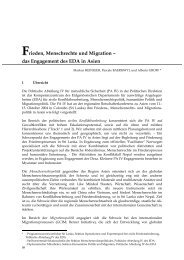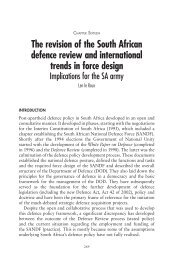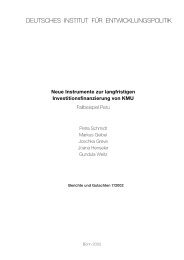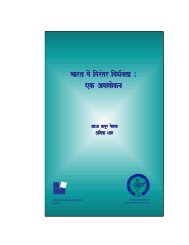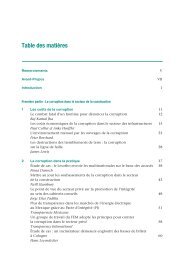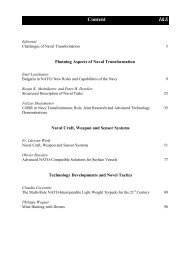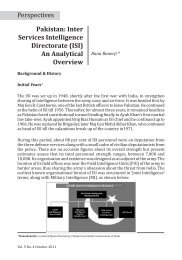Andreas Stamm Eva Dantas Doris Fischer Sunayana ... - ETH Zürich
Andreas Stamm Eva Dantas Doris Fischer Sunayana ... - ETH Zürich
Andreas Stamm Eva Dantas Doris Fischer Sunayana ... - ETH Zürich
Create successful ePaper yourself
Turn your PDF publications into a flip-book with our unique Google optimized e-Paper software.
<strong>Andreas</strong> <strong>Stamm</strong> et al.<br />
On the other hand, specific setbacks and potential barriers can be identified that could<br />
hinder the development of SoIS, specifically in developing countries. For instance, while<br />
they are increasingly strong global players, anchor countries are still characterised by high<br />
levels of poverty. Governments achieve their legitimacy mainly by delivering social progress,<br />
i.e. employment creation and poverty reduction, and not so much by improving the<br />
environmental quality of the growth process or lowering the carbon footprint of the economy.<br />
This would imply that the resources dedicated to the environmental dimension of<br />
sustainable development might be directly competing with other efforts that may, in many<br />
countries, be given higher political priority. This refers not exclusively to the financial<br />
resources but also to the human resources available at the policy making and management<br />
levels of the societies concerned, as the shaping and monitoring of SoIS require especially<br />
high governance capacities and implementation capabilities.<br />
It thus appears to be an open research question whether the balance of advantages<br />
and disadvantages is positive or negative when it comes to assessing whether sustainability-oriented<br />
innovations are a viable opportunity for anchor countries to reach a<br />
technological par with the OECD world. Coming up with an answer to this question is,<br />
however, of crucial importance in assessing the possible contribution of anchor countries<br />
and their innovation systems to the transition towards more sustainable development paths<br />
and strategic options for international cooperation in this context.<br />
5.3 Towards global innovation systems for sustainability?<br />
Globalisation is obviously affecting the generation of knowledge and the development and<br />
deployment of technologies. The number of internationally co-authored scholarly papers is<br />
continuously increasing, including papers with the participation of researchers from developing<br />
and anchor countries. International research networks are emerging, triggered by<br />
special funding arrangements, such as the EU Framework Programmes, in which partners<br />
in the South are invited to participate. Whereas in the past international cooperation in<br />
science and technology was mainly shaped by interests and decisions of individual researchers<br />
or organisations, international cooperation in publicly funded research is increasingly<br />
organised in keeping with deliberate political strategies. One example is the<br />
Strategy for Internationalisation of Science and Research approved by the German cabinet<br />
in February 2008.<br />
Internationalisation is also affecting private sector R&D, mainly through the relocation of<br />
knowledge-intensive activities by technology-based companies. It is still a matter of debate<br />
how these internationalisation processes proceed and to what extent they also involve<br />
non-traditional actors such as anchor countries. 23<br />
New international discourses are emerging on how the formation of global innovation<br />
systems that may assist the transition towards more sustainable development patterns can<br />
be shaped by policy makers. These are mainly triggered by an increasing awareness of the<br />
severity of climate change and other global challenges (energy, food security) and the urgent<br />
need to decouple economic growth from emissions and resource depletion. It seems<br />
23 See Altenburg / Schmitz / <strong>Stamm</strong> (2007) for China and India.<br />
36<br />
German Development Institute / Deutsches Institut für Entwicklungspolitik (DIE)






